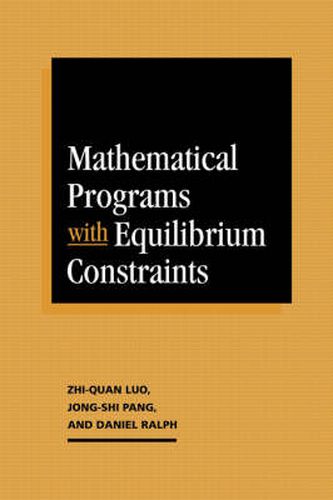Readings Newsletter
Become a Readings Member to make your shopping experience even easier.
Sign in or sign up for free!
You’re not far away from qualifying for FREE standard shipping within Australia
You’ve qualified for FREE standard shipping within Australia
The cart is loading…






This book provides a solid foundation and an extensive study for an important class of constrained optimisation problems known as Mathematical Programs with Equilibrium Constraints (MPEC), which are extensions of bilevel optimisation problems. The book begins with the description of many source problems arising from engineering and economics that are amenable to treatment by the MPEC methodology. Error bounds and parametric analysis are the main tools to establish a theory of exact penalisation, a set of MPEC constraint qualifications and the first-order and second-order optimality conditions. The book also describes several iterative algorithms such as a penalty based interior point algorithm, an implicit programming algorithm and a piecewise sequential quadratic programming algorithm for MPECs. Results in the book are expected to have significant impacts in such disciplines as engineering design, economics and game equilibria, and transportation planning, within all of which MPEC has a central role to play in the modelling of many practical problems.
$9.00 standard shipping within Australia
FREE standard shipping within Australia for orders over $100.00
Express & International shipping calculated at checkout
This book provides a solid foundation and an extensive study for an important class of constrained optimisation problems known as Mathematical Programs with Equilibrium Constraints (MPEC), which are extensions of bilevel optimisation problems. The book begins with the description of many source problems arising from engineering and economics that are amenable to treatment by the MPEC methodology. Error bounds and parametric analysis are the main tools to establish a theory of exact penalisation, a set of MPEC constraint qualifications and the first-order and second-order optimality conditions. The book also describes several iterative algorithms such as a penalty based interior point algorithm, an implicit programming algorithm and a piecewise sequential quadratic programming algorithm for MPECs. Results in the book are expected to have significant impacts in such disciplines as engineering design, economics and game equilibria, and transportation planning, within all of which MPEC has a central role to play in the modelling of many practical problems.